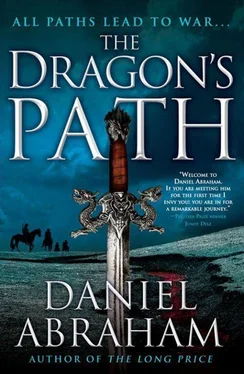Daniel Abraham - The Dragon's Path
Здесь есть возможность читать онлайн «Daniel Abraham - The Dragon's Path» весь текст электронной книги совершенно бесплатно (целиком полную версию без сокращений). В некоторых случаях можно слушать аудио, скачать через торрент в формате fb2 и присутствует краткое содержание. Жанр: Фэнтези, на английском языке. Описание произведения, (предисловие) а так же отзывы посетителей доступны на портале библиотеки ЛибКат.
- Название:The Dragon's Path
- Автор:
- Жанр:
- Год:неизвестен
- ISBN:нет данных
- Рейтинг книги:4 / 5. Голосов: 1
-
Избранное:Добавить в избранное
- Отзывы:
-
Ваша оценка:
- 80
- 1
- 2
- 3
- 4
- 5
The Dragon's Path: краткое содержание, описание и аннотация
Предлагаем к чтению аннотацию, описание, краткое содержание или предисловие (зависит от того, что написал сам автор книги «The Dragon's Path»). Если вы не нашли необходимую информацию о книге — напишите в комментариях, мы постараемся отыскать её.
The Dragon's Path — читать онлайн бесплатно полную книгу (весь текст) целиком
Ниже представлен текст книги, разбитый по страницам. Система сохранения места последней прочитанной страницы, позволяет с удобством читать онлайн бесплатно книгу «The Dragon's Path», без необходимости каждый раз заново искать на чём Вы остановились. Поставьте закладку, и сможете в любой момент перейти на страницу, на которой закончили чтение.
Интервал:
Закладка:
Geder
In the rolling flint hills where Sarakal gave way in no clearly marked fashion to the Keshet, the term prince had a different meaning than Geder was accustomed to. A man might call himself a prince if he controlled a certain amount of land, or commanded a force of soldiers, or had been son or nephew to a prince. Even race had little impact. The princes of the Keshet might be Yemmu or Tralgu or Jasuru, and there was apparently no formal barrier to other races, though in practice no others were.
Firstblood were especially absent from the wide, arid plains, and Geder found that his small group—himself, his squire, and four men of his father’s service—quickly became an object of curiosity in the towns and villages east of Sarakal. The Firstblood prince, they called him, and when Geder tried to correct them, confusion followed. Translating his rank into the terms of the Keshet was a pointless and probably impossible task, and so when the traveling court of Prince Kupe rol Behur extended Geder its hospitality, he found it easiest to pretend he was more or less an equal to the gold-scaled Jasuru lord.
“I don’t understand, Prince Geder. You’ve left your land and your people searching for something, but you don’t know what or where it is. You have no claim to it, nor any idea whether claim could be made. What profit do you hope to make?”
“Well, it isn’t that kind of project,” Geder said, reaching for another of the small, dark sausages from their communal plate.
When Geder had seen the dust plume from the traveling court rising above the horizon like smoke from a great fire, he’d expected it to be like being on campaign. He’d imagined the tents to be something like the kind he’d slept in to and from Vanai, that he slept in now in his quiet exile. He had misunderstood. He hadn’t ridden into a camp—not even a grand and luxurious one. It was a township of wood-framed buildings with a temple dedicated to a twinned god Geder hadn’t heard of and a square for the prince’s feast. Weeds and scrub in the streets showed that it had not been there the day before. Geder assumed it wouldn’t be there tomorrow. Like something from a legend, it was a city that existed for a single night, and then vanished with the dew. Torches smoked and fluttered in the breeze. The stars glowed down. The summer heat rose from the ground, radiating up into the sky.
Geder popped the sausage into his mouth. It tasted salty and rich, with an almost occult aftertaste of sugar and smoke. He’d never eaten anything like it before, and if it had been made of lizard eyes and bird feet, he’d have eaten them anyway. They tasted that good. Of the sixteen communal plates that the slaves carried around the table, this was his favorite. Although the green leaves with red spots and oil was a close second.
“I’m not looking,” he said through his full mouth, “for something that will get me gold.”
“Honor, then.”
Geder smiled ruefully.
“Speculative essay isn’t something that gives a man great honor. At least not among my people. No, I’m going because I’ve heard about a thing that existed a long time ago, and I wanted to see what I could find out about it. Write down what I’ve learned and what I suspect, so that someday someone can read it and add what they know.”
And, he thought, stay away from the turmoil in Camnipol and find a corner at the farthest edge of the world where the trouble’s least likely to reach me.
“And then?”
Geder shrugged.
“That’s all,” he said. “What more would there be?”
The Jasuru prince frowned, drank from a mug either cast in the shape of a massive skull or else made from one, and then grinned, pointing a long worked-silver talon at him.
“You’re a holy man,” the prince said.
“No. God no. Not me.”
“A cunning man, then. A philosopher.”
Geder was about to protest this too, but then caught himself.
“Maybe a philosopher,” he said.
“A man, his mount, and the horizon. I should have seen it. This project is a spiritual matter.”
The prince lifted his massive arm, barked something that sounded like an order. The hundred men and women at the long tables—knights or only sword-and-bows, Geder couldn’t be sure—raised a shout, laughing and sneering and pushing one another. A few long moments later, a pair of guards appeared at the edge of the square, each with an iron chain in his hand. The chains led back into the darkness, slack in a way that left Geder thinking they were mostly ceremonial.
The woman who came into the light at the end of the chains looked ancient. The broadness of her forehead and the swirling black designs on her skin marked her as a Haavirkin even before she lifted her long, three-fingered hand in salute. Geder had met Haavirkin before when the elected king of Hallskar sent ambassadors to court, but he’d never seen one as old or with the same sense of utter dignity.
The guards walked before the woman as she approached the prince. Geder couldn’t tell from the noise of the crowd whether they were mocking her or celebrating her presence. Her eyes swept over Geder, sizing him up.
“This is my seer,” the prince said to him. And then to the woman, “This man is our guest. His travels the Keshet on a spiritual matter.”
“He does,” the woman agreed.
The prince grinned like she’d given him a present. He put his hand on Geder’s arm in an oddly intimate gesture.
“She is yours for tonight,” the prince said. Geder frowned. He hoped that this wasn’t a question of having a bed servant, though he had heard stories about that kind of thing from old stories about the Keshet. He coughed and tried to think of a way clear, but the seer only lifted her hand. Another servant hurried forward with a wooden stool, and the Haavirkin sat on it, staring at Geder’s face.
“Hello,” Geder said to her, his voice uncertain.
“I know you,” she said, then turned and spat on the ground. “When I was a girl, I had a dream about you.”
“Um,” Geder said. “Really?”
“She is very good,” the prince said. “Very wise. ”
“My uncle had an illness,” the seer said, “only it had no signs. No fever, no weakness, nothing, so there was nothing we knew to cure.”
“But then how can you say he was sick?”
“It was a dream,” the seer said patiently. “He ate bitter herbs to cure himself, and afterward the water he drank tasted sweet. But there wasn’t anything in it but water. The sweet was in him, and it wasn’t sweet really. Only that it wasn’t bitter. It didn’t have the power to cure anything.”
The seer took his hand, her long fingers exploring the joints of his fingers as if she were searching for something. She lifted his palm to her nose and sniffed at it. Geder’s skin crawled, and he tried to pull away.
“You will see her thrice,” she said, “and you will be different people each time. And each time, she will give you what you want. You have already seen her once.”
The seer lifted her eyebrows, as if to say, Do you understand?
That was supposed to be about me? Geder thought.
“Thank you,” Geder said, and she nodded as much to herself as to anyone else. The dancing torchlight made the black marks on her skin seem to shift with a motion of their own.
“That’s all?” the Jasuru prince said.
“That is all that I have for him,” the seer said mildly. She rose to her feet, the chains leading from her neck jingling. “You and I will speak, but later.”
She made her obeisance, turned, and walked back out through the low scrub and dust, the wooden tables of Keshet warriors and shadows. The chain bearers followed her as if she were leading them. The silence was broken only by the sound of the chain and the mutter of fire from the torches. Geder thought he saw surprise, even shock, on the faces of the knights, but he didn’t understand it. Something had just happened, but he couldn’t say what.
Читать дальшеИнтервал:
Закладка:
Похожие книги на «The Dragon's Path»
Представляем Вашему вниманию похожие книги на «The Dragon's Path» списком для выбора. Мы отобрали схожую по названию и смыслу литературу в надежде предоставить читателям больше вариантов отыскать новые, интересные, ещё непрочитанные произведения.
Обсуждение, отзывы о книге «The Dragon's Path» и просто собственные мнения читателей. Оставьте ваши комментарии, напишите, что Вы думаете о произведении, его смысле или главных героях. Укажите что конкретно понравилось, а что нет, и почему Вы так считаете.










